|
|
|
Sort Order |
|
|
|
Items / Page
|
|
|
|
|
|
|
| Srl | Item |
| 1 |
ID:
129477
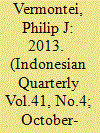

|
|
|
|
|
| Publication |
2013.
|
| Summary/Abstract |
The year 2013 has been seen as a prelude to the so-called political year of 2014. One of the weirdest political scenes in 2013 was when political parties had to advertise in the media in order to find people to
be listed as their candidates for the parliamentary election. Moreover, the parties had to rush in recruiting the candidates to meet deadlines for names submission set out by the Indonesian Election Commission KPU). This can be understood as a symptom of how dysfunctional our political parties are. Party recruitment and training program are indicators of whether or not a political party is well-functioning. A political party has to be ready with its recruitment process immediately after an election is done. It has to start all internal political process right away. By doing so, those who lost in the election will be able to quickly regroup while the winner consolidates. But what we saw in such an advertisement in the media simply reinforces the image
widely held by the public that politicians and /or political parties are just regular job seekers. Politicians are no longer thought of as noble individuals. Politics then become an arena which good people do not intend to enter.
|
|
|
|
|
|
|
|
|
|
|
|
|
|
|
|
| 2 |
ID:
156423
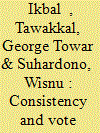

|
|
|
|
|
| Summary/Abstract |
This article examines ambivalence—the simultaneous holding of two or more conflicting values or beliefs about a political issue—among Indonesian citizens’ attitudes about vote buying. Using an original survey taken during the 2014 Indonesian elections, we analyse the factors related both to citizens’ normative views about vote buying and their willingness to accept gifts from candidates. A large number of citizens demonstrate ambivalence by viewing the practice as unjustified or corrupt and yet expressing willingness to accept money from candidates. We also examine the differential effects of education and income on these attitudes. Consistent with “demand side” theories of vote buying, low income creates economic pressure to accept money but does not influence normative attitudes about vote buying. Education, however, has a broader effect by influencing both normative attitudes and willingness to accept money. We consider implications of these results for Indonesian officials focused on reducing vote-buying behavior.
|
|
|
|
|
|
|
|
|
|
|
|
|
|
|
|
| 3 |
ID:
148517
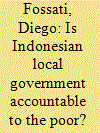

|
|
|
|
|
| Summary/Abstract |
Since decentralization in 2001, Indonesian local governments have acquired a key role in poverty alleviation and social service delivery. The extent to which they have been able to meet this challenge is subject to debate, however, and systematic analysis of policy outcomes remains scarce. This paper contributes to the literature with a study of the district-level implementation of Jamkesmas, Indonesia's free healthcare program for the poor. Using original data on policy implementation, I show that local government is to some extent responsive to the needs of the most vulnerable. In years when local elections (pilkada) are implemented, low-income households are targeted more accurately, suggesting that electoral incentives for local elites may increase access to social services among the poor. However, I also show that the positive effect of local direct elections is limited to districts with electorally competitive politics.
|
|
|
|
|
|
|
|
|
|
|
|
|
|
|
|
| 4 |
ID:
111167


|
|
|
| 5 |
ID:
130576
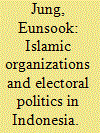

|
|
|
|
|
| Publication |
2014.
|
| Summary/Abstract |
What role do Muslim social and educational organizations play in Indonesian politics after democratization? When democratization opens up a larger political space for Islamic organizations to participate in politics, do Muslim organizations emerge as political powers or remain socio-religious organizations? How do Muslim organizations engage in electoral politics? This article addresses these questions by examining the role of Muhammadiyah in democratic Indonesian politics. The author argues that Muhammadiyah's political behaviour is driven by its institutional logic, which places its religious and social duties before its political interests. Although there have been attempts by some elites to take advantage of Muhammadiyah for their own political gains, Muhammadiyah has managed to refrain from building or supporting a particular political party at the organizational level. Moreover, political learning through unsuccessful outcomes in initial elections and bitter experience with PKS also alerted Muhammadiyah to the need to protect itself from partisan politics by emphasizing its organizational principle. This article also demonstrates how religious institutions use politics for religious ends and to confirm the integrity of their community.
|
|
|
|
|
|
|
|
|
|
|
|
|
|
|
|
| 6 |
ID:
184912
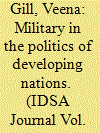

|
|
|
| 7 |
ID:
128532
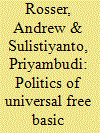

|
|
|
|
|
| Publication |
2013.
|
| Summary/Abstract |
Since the fall of Suharto's New Order, Indonesia's central government has substantially strengthened the legal and financial basis of universal free basic education (UFBE). Yet sub-national governments have varied considerably in their responses to the issue with some supporting UFBE and others not. Why has this happened? What are the implications for the future of UFBE in Indonesia? And what does Indonesia's sub-national experience tell us about the political preconditions for UFBE in developing countries? We try to shed some light on these questions by examining the politics of UFBE in Bantul and Sleman, two districts in the Special Region of Yogyakarta.
We argue (i) that these districts' different responses to UFBE have reflected the extent to which their bupati have pursued populist strategies for mobilising votes at election time and there has been resistance to UFBE from groups such as business, the middle classes, and teachers; (ii) that Indonesia's sub-national experience suggests that there is an alternative pathway to UFBE besides organisation of the poor by political entrepreneurs; and (iii) that the future of UFBE in Indonesia thus rests on the nature of bupatis' strategies for advancing their careers and the strength of local groups opposed to UFBE.
|
|
|
|
|
|
|
|
|
|
|
|
|
|
|
|
| 8 |
ID:
076782
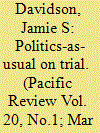

|
|
|
|
|
| Publication |
2007.
|
| Summary/Abstract |
This article explores to what extent to local pro-reform actors matter in Indonesia through the prism of anti-corruption campaigns in the country's regions. I argue that the rash of anti-corruption campaigns and related trials involving legislative members, especially from mid-2004 onward, can be attributed neither to the resources lavished on anti-corruption organizations based in Jakarta, nor to the popularity of President Yudhoyono's anti-corruption rhetoric. Instead, it can be traced to a particular anti-corruption campaign that began in earnest in 2002 in Padang, West Sumatra. Using a multi-dimensional approach, a small group of activists relentlessly pursued their newly elected provincial legislators to be accountable to their democratic mandates and as important, to respect the rule of law pursuant to new national anti-corruption legislation. The guilty verdicts of May 2004 galvanized similar groups across the country to investigate their respective legislative bodies. This exemplary case of societal accountability also demonstrated the leverage activists can gain over local politicians when they forge coalitions with other elite actors, especially those in Jakarta. I further explore two anti-corruption cases in the province of West Kalimantan to place post-Padang developments in their proper perspective. If hopes were raised that regional anti-corruption movements-based on the Padang model-might accomplish more than sensational trials but help consolidate democracy at the regional level by holding elected officials accountable, these two examples show how fleeting these expectations might be. The trials that took place but which produced no convictions resulted from the fallout of local political tussles, and not from local civil society organizations galvanized by the ideals of transparency and good governance.
|
|
|
|
|
|
|
|
|
|
|
|
|
|
|
|
| 9 |
ID:
154518
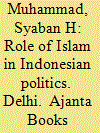

|
|
|
|
|
| Publication |
DelhI, Ajanta Books International, 1999.
|
| Description |
xix, 257p.hbk
|
| Standard Number |
8120203046
|
|
|
|
|
|
|
|
|
|
|
|
Copies: C:1/I:0,R:0,Q:0
Circulation
| Accession# | Call# | Current Location | Status | Policy | Location |
| 059140 | 297.27209598/MUH 059140 | Main | On Shelf | General | |
|
|
|
|
| 10 |
ID:
176982
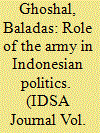

|
|
|
| 11 |
ID:
134045
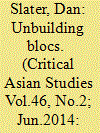

|
|
|
|
|
| Publication |
2014.
|
| Summary/Abstract |
Political blocs and cleavages do not emerge and endure unless political parties construct and cultivate them. When Indonesia democratized in the late 1990s, it appeared that party competition would be characterized by two primary cleavages that had been incubated under Suharto's "New Order": a regime cleavage pitting reformist opponents of the fallen dictatorship against its holdovers, and a religious cleavage distinguishing parties by their views on the proper political role for Islam. Some fifteen years after Suharto's departure, neither a reformist nor a religious bloc exists in Indonesian politics. This is not because reformist and religious themes lack resonance among voters, but because party elites have effectively abandoned cleavage politics by promiscuously sharing power in an all-encompassing party cartel. Party leaders have behaved as if they are more accountable to each other than to their presumptive support blocs, leaving reformist and religious social forces without reliable party champions in national politics. This article traces the origins of Indonesia's "accountability deficit" to the elite deal making that accompanied the formation of the country's first democratic governing coalitions in 1999 and 2001. By promiscuously sharing power across cleavage lines, party leaders fostered voter de-alignment in the 2004 and 2009 elections. This de-alignment has left Indonesian democracy vulnerable to the highly unpredictable politics of individuals rather than the more predictable politics of institutions as the 2014 elections approach, ominously opening the door to populist and anti-system challengers striving to rebuild the political blocs that party elites have recently unbuilt.
|
|
|
|
|
|
|
|
|
|
|
|
|
|
|
|
|
|
|
|
|